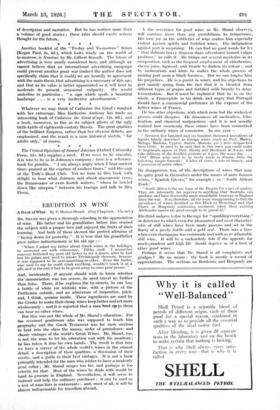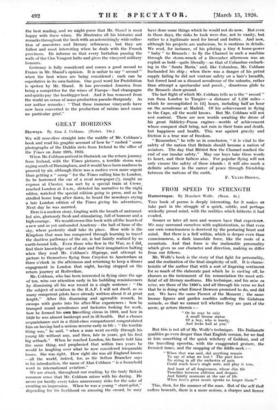ERUDITION IN WINE
A Boit& of Wine: By P. Morton Shand. (Guy Chapman. 155. net.) MR. SHANP was given a thorough schooling in the appreciation of wine. His father and his grandfather before him studied the subject with a proper love and enjoyed the fruits of their
learning. And both of them showed the perfect altruism of " laying down for posterity." It is true that his grandfather
grew. rather indiscriminate in his old age :— " 'When I asked my father about Greek wines in the holidays, he answered me with, vehemence, Filthy stuff. I remember someone. bothered my poor old father to try a dozen, after he had lost his palate and ussd to smoke Trichinopoly cheroots, because it was -supposed to be anti-something-or-other. Even -the butler, who used to say he could drink anything, wouldn't touch it at a gift, and in the end it had to be given away to some poor person.' "
And, incidentally, if anyone should wish to know whether the denunciation was too severe, he need travel no further than Soho. There, if he explores the by-streets, he can buy a bottle of white (or whitish) wine, with a picture of the Parthenon outside, and an admixture of turpentine, pitch, and, I think, quinine inside. . These ingredients are used by the Greeks to make their cheap wines keep better and act more wholesomely ; and it is reported that a man bred urslo them can bear no other wines.
But this was not the whole of Mr. Shand's education. For the reverend gentleman who was supposed to teach him geography and the Greek Testament was far more anxious to beat into the class the names, order of precedence, and classic vintages of the world's Great Wines. Mr. Shand, too, is not the man to let his education end with his monitors ; he has taken it into his own hands. The result is that here we have a survey of the whole world's wines in the utmost detail, a description of their qualities, a discussion of their merits, and a guide to their best vintages. It is not a book primarily intended for the man who wishes to have .a modestly good cellar ; Mr. Shand ranges too far, and perhaps is too eclectic for that. Most of the wines he deals with would be hard to procure in England. Nevertheless, it will serve to instruct and help the ordinary purchaser ; it can be used as a test of wine-lists-in restaurants ; and, most of all, it will be almost indispensable for travellers abroad.
A due reverence for good wine, as Mr. Shand observes, will conduce more than any prohibitions to temperance. His own joy in the subtleties of wine makes him especially violent against spirits and fortified wines. His indignation against port is surprising. He can find no good words for it : " that dubious heavy dragoon dago adventurer turned vulgar profiteer," he calls it. He brings out several mysteries- in its composition, such as the frequent employment of elderberries; cherry-juice, logWodd; and treacle to darken its colour ; and by insinuations and hints he makes the whole process of making port seem a black business:' But we can forgive-him. his prejudices. He is a purist in wines, and his objections to port mainly spring from the fact that it is blended from
types of grapes and fortified with brandy to delay fermentation. But it must be explained that he is, on the whole, a Francophile in his drink, and angry that Portugal should have a commercial preference at the expense of the lighter wines of France. . - Ile has other objections, with which none but the wickedest grocers could disagree. He denounces all medication, falsi- fication, and chemical malpractices—and it is not usually realized how commonly these crimes have been committed in the ordinary wines of commerce. In one year— •
Between five hundred and six hundred thousand hectolitres of liquids falsely described as foreign wines (such as Port, Sherry, Malaga, Madeira, Cyprus, Samos, Marsala, etc.) were despatched from Cette. It used to be said that in this town you could ordez 50 hogsheads apiece of Port, Sherry and Bordeaux at 9 a.m. and take delivery of the finished mixture at 4 p.m. the same day . •. . Old? Rhino wine used to be freely made in Russia, from the following simple formula : 3 kilos of cider, 1 kilo of brandy, and 8 grammes of azotic ether."
He disapproves, too, of the descriptions of wines that may be quite good in themselves under the names of more famous wines, " Spanish Graves," for example ; or " South African Hock." -
" South Africa is tho one hope of tho Empire for wines of quality. They are inherently far superior to anything that Australia can produce, and have deservedly made remarkable headway in England since the war.. It is, therefore, all the more disappointing to find the prevalence of wines decribed as this Hock or Hermitage and that Claret or Burgundy continuing unabated, when their existing Afrikander names are good enough to be proud of."
His third sadness is due to the rage for " sparkling everything;' in deference to which even the pleasantest and most character- istic of still wines have been made gaseous and set in the finery of a gaudy bottle and a gold seal. There was a time when even champagne was commonly met with as an admirable still wine. It will be a melancholy fate if the appetite for mock grandeur and high life should deprive us of a host of other good wines.
Perhaps it seems that Mr. Shand is all complaints and grudges ? By no means ; the book is mostly a record of appreciations. The sections on Bordeaux and Burgundy are the best reading, and we might guess that Mr. Shand is most happy with these wines. He illustrates all his histories and remarks throughout the book with an astonishingly wide collec- tion of anecdotes and literary references ; but they are fullest and most interesting when he deals with the French provinces. He informs us that every battalion passing the walls of the Clos Vougeot halts and gives the vineyard military honours.
Germany is fully considered and comes a good second to France in Mr. Shand's opinion. It is unfair to say " second " when the best wines are being considered ; each can be superlative in its own fashion. One good word for Prohibition is spoken by Mr. Shand. It has prevented America from being a competitor for the wines of Europe—bad champagne and spirits pay the bootlegger best. And it has removed from the world an ocean of mass-production pseudo-Burgundy. As our author remarks : That these immense vineyards have now been converted to the production of raisins need cause no particular grief."































































 Previous page
Previous page